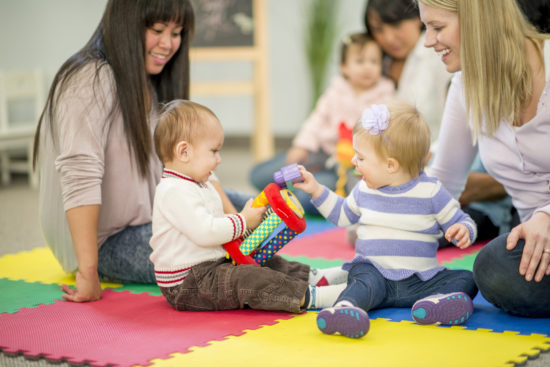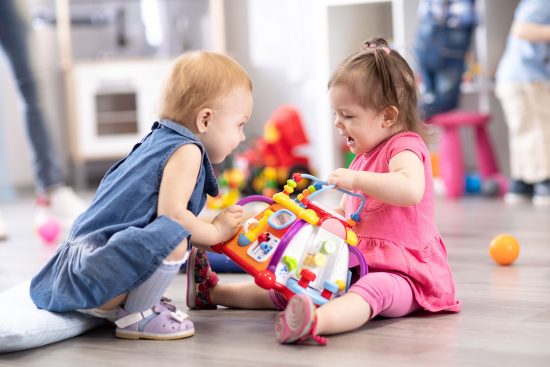Ever tried negotiating with your toddler? Not easy, right? Babies don’t always have the most refined tastes or opinions. But when do they realise others might not be on exactly the same page as them? And how can parents encourage empathy?
Empathy is the ability to perceive and understand other people’s emotions and to react appropriately. Expecting your toddler to pass you a beaker of milk and say ‘I know, I know…’ as you moan about the bills? Maybe not. But we know a lot of parents are fascinated by when their children can start to understand others’ experiences and feelings. And sometimes, that can just be a teddy with a sore tummy.
We live in a social world so it’s important to show empathy towards others
We live in a social world so it’s important to show empathy towards others. That’s because empathy can be a motivator towards us being more thoughtful, helpful and cooperative. Empathy also makes us responsive.
There’s a link between children being empathetic in their early lives and a tendency to being more giving and considerate as they get older. In studies with children whose mothers are depressed, the children showed slower signs of responding to stimulus like music, voices and facial expressions.
There’s empathy and then there’s empathy. Newborns cry in response to another newborn’s cry, which researchers agree are early signs of empathy development.

Studies also show that when a newborn hears a baby crying, their sucking motion and heart rate slow, as a response to the sound.
This physical reaction might not be what we normally describe as empathy but when babies don’t react in this way, it might predict a lack of empathy as the child grows.
It’s generally thought that empathy proper begins to show itself in the second year of life. But it could be there a lot earlier.
Research with eight-month-old babies showed that when one of them was in distress, the others took action so their mate got help more quickly. OK, so they weren’t ringing 999. But by looking at the distressed infant and the other mothers, rather than their own, they were able to convey the message that ‘Oi, one of us needs help’.
To be able to empathise with someone, you have to identify yourself as a different and unique thing. Bear with us. We generally begin to become self-aware at about two years old. And it’s in this second year of life that we see the start of showing concern for others.
Our ability to empathise is a mixture of our genetic disposition and our environment. And our environment plays an increasingly important role the older we get.

We’ve all been there. A child is playing nicely with a toy and another child barges up to them and pushes them over to get to it. It’s distressing enough if you’re the child, let alone the parent of the marauder.
Empathy helps us understand the world through someone else’s experiences. It allows us to understand what others need and provide support to make them feel better.
Sounds like a lot for a young child to do? You’d be surprised.
1. Empathic concern – wanting to help another person in distress.
2. Hypothesis testing – trying to understand what happened to cause the distress.
3. Prosocial behaviour – trying to make things better through giving a hug, for example.
What can we do to help our children develop this vital skill for life? The following science-based tips could help the empathy flourish:
If your child feels secure and able to express their own emotions, both good and bad, that makes it easier to help others.
The more time you take to discuss how you, your child or even that teddy with a sore tummy might be feeling, the more it becomes part of their everyday life to consider others.
From a very young age, we find it easier to empathise with someone we see as similar. And prejudices can start when we have little or no contact with people who are different from us. One of the best ways to find things in common is to spend time with other people.
Children can easily misinterpret someone’s facial expression
Being able to read nonverbal cues can help them understand how someone is feeling.
Children don’t automatically know the difference between a happy face, a sad face or an angry face and can easily misinterpret someone’s facial expression.
So by playing games or using toys with different faces, you can help them get a head start.
Research has shown that when we play-act at facial expressions, we actually experience some of the emotion we’re trying to show. So we can help develop empathy by role-playing and it really can help us feel what someone else is going through
Children are capable of feeling empathy a lot earlier than you might have thought. As parents and carers, we can help develop this important life skill via daily fun and games. So give some games a go.
Our support line offers practical and emotional support with feeding your baby and general enquiries for parents, members and volunteers: 0300 330 0700.
You might find attending one of NCT’s Early Days groups helpful as they give you the opportunity to explore different approaches to important parenting issues with a qualified group leader and other new parents in your area.
Make friends with other parents-to-be and new parents in your local area for support and friendship by seeing what NCT activities are happening nearby.